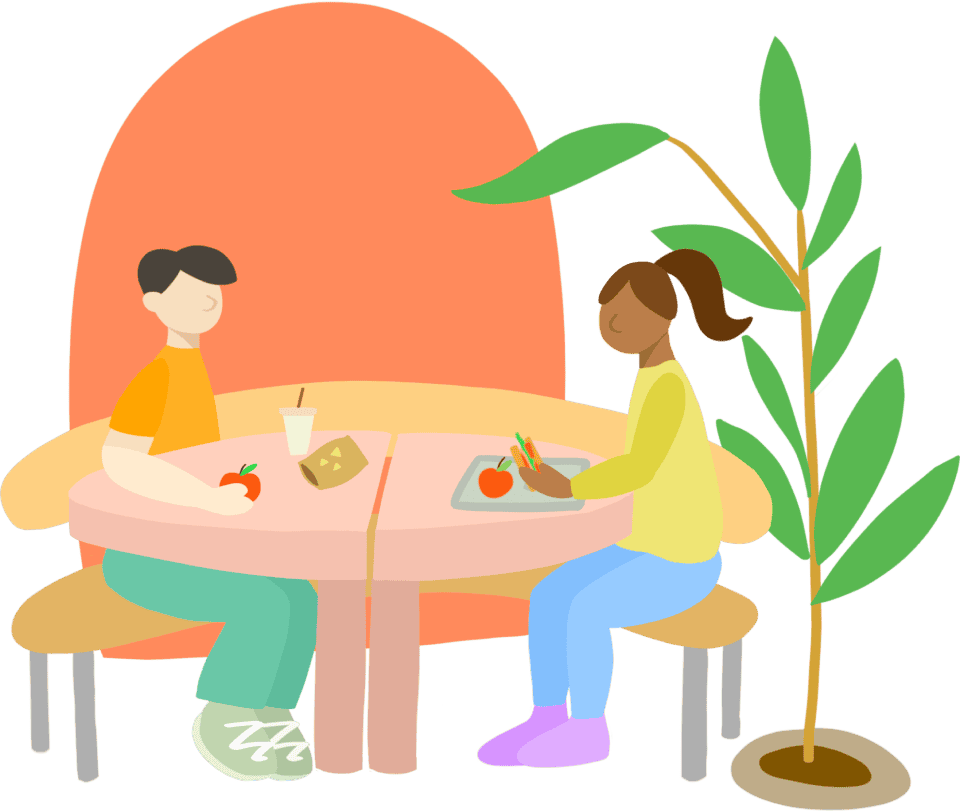Grade 7
The seventh-grade curriculum is comprised of Units 1-3. Contrary to the approach for the elementary and high school grade-level kits, which include all six units, the Grade 7 and 8 products are split into two parts with three units each. This allows extra time for the middle school lessons to explore the concepts more thoroughly and suitably for the age group.
In Unit 1, students are introduced to the ongoing PALS (Positive Actions Lead to Success) radio talk show, “Teens for a Positive World,” which is combined with a radio drama, “We're on Our Way.” The drama includes a description of the main characters and settings that will make up the real-life situations involving middle school students and the concepts taught in the Positive Action lessons. Students step into the roles of the radio play characters, and by relating to these fictional characters, students can discuss the issues representationally more than personally. The talk show, integrated with the drama, facilitates the discussion and reinforcement of the lesson concepts as they apply to the students' actual classroom and school situations, local culture, and other relevant issues related to their physical, intellectual, social, and emotional learning—specifically, self-management.
Students also learn that they will become their own self-concept scientists by applying the scientific method: question, hypothesis, method, results, and conclusion. They study how to conduct a simple, scientific study of themselves through periodic personal assessment, data collection, data analysis, and report writing.
As students learn more about themselves, they begin to better understand their “Three I's”—identity, image, and impression. Identity is who they really are, image is who they sometimes try to portray, and impression is how others perceive them. Their work as a self-concept scientist informs and improves the way they feel about themselves by becoming someone with integrity and authenticity.
In Unit 2, students focus on how to take care of their bodies and minds. For their physical selves, they learn the essentials of good physical health: exercise, nutrition, hygiene, and refusing to abuse their bodies. To improve their intellectual health, they consider brain research and learn about right- and left-brain hemispheres as well as the need to be a “whole-brain learner.”
In Unit 3, students learn the positive actions to help them effectively manage themselves by managing their resources like time, energy, talents, possessions, and emotions. They learn that self-management means exerting self-discipline as they positively manage their lives, which they discover contributes greatly to their success and happiness. They also plan a celebration to wrap up what they have learned about themselves and how positive actions help them feel good about who they are.


The seventh-grade curriculum is comprised of Units 1-3. Contrary to the approach for the elementary and high school grade-level kits, which include all six units, the Grade 7 and 8 products are split into two parts with three units each. This allows extra time for the middle school lessons to explore the concepts more thoroughly and suitably for the age group.
In Unit 1, students are introduced to the ongoing PALS (Positive Actions Lead to Success) radio talk show, “Teens for a Positive World,” which is combined with a radio drama, “We're on Our Way.” The drama includes a description of the main characters and settings that will make up the real-life situations involving middle school students and the concepts taught in the Positive Action lessons. Students step into the roles of the radio play characters, and by relating to these fictional characters, students can discuss the issues representationally more than personally. The talk show, integrated with the drama, facilitates the discussion and reinforcement of the lesson concepts as they apply to the students' actual classroom and school situations, local culture, and other relevant issues related to their physical, intellectual, social, and emotional learning—specifically, self-management.
Students also learn that they will become their own self-concept scientists by applying the scientific method: question, hypothesis, method, results, and conclusion. They study how to conduct a simple, scientific study of themselves through periodic personal assessment, data collection, data analysis, and report writing.
As students learn more about themselves, they begin to better understand their “Three I's”—identity, image, and impression. Identity is who they really are, image is who they sometimes try to portray, and impression is how others perceive them. Their work as a self-concept scientist informs and improves the way they feel about themselves by becoming someone with integrity and authenticity.
In Unit 2, students focus on how to take care of their bodies and minds. For their physical selves, they learn the essentials of good physical health: exercise, nutrition, hygiene, and refusing to abuse their bodies. To improve their intellectual health, they consider brain research and learn about right- and left-brain hemispheres as well as the need to be a “whole-brain learner.”
In Unit 3, students learn the positive actions to help them effectively manage themselves by managing their resources like time, energy, talents, possessions, and emotions. They learn that self-management means exerting self-discipline as they positively manage their lives, which they discover contributes greatly to their success and happiness. They also plan a celebration to wrap up what they have learned about themselves and how positive actions help them feel good about who they are.
Pasela is a digital product presented by Positive Action.
Find out more